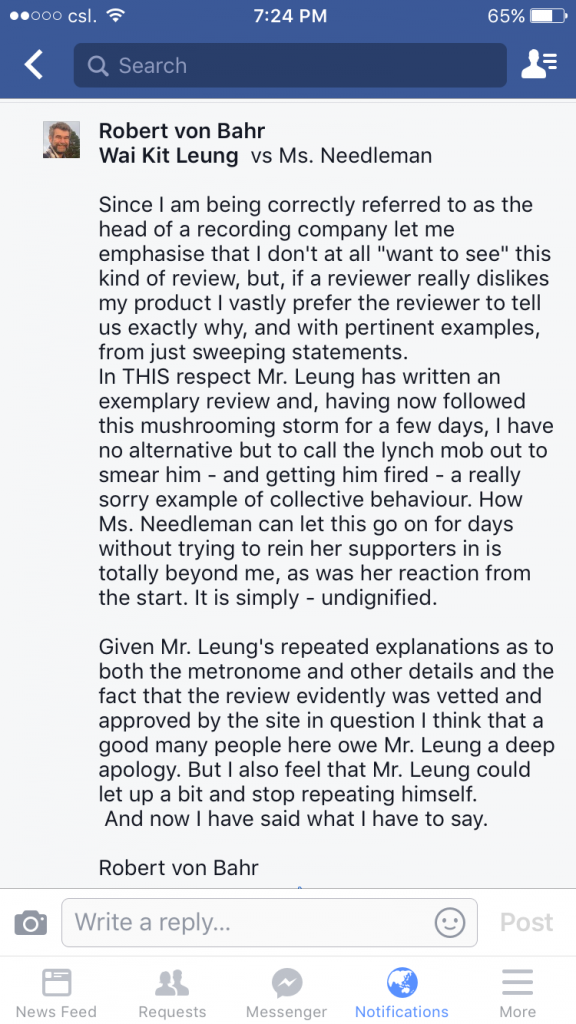Because of the vicious and violent mafia mob led by oboist Katherine Needleman and Atlantic Woodwindrepair (bassoonist Rick Shepard), I am no longer a reviewer for MusicWeb International. However, this vicious and senseless attack is not going to deter me from giving my honest opinion on commercial recordings. I will be posting reviews here regularly. I hope you will enjoy them!
 Gernot WOLFGANG (b. 1957)
Gernot WOLFGANG (b. 1957)
Passing Through – groove-oriented chamber music, vol. 3
- Flurry [3:11]
- String Theory [17:10]
- Passing Through [9:54]
- New England Travelogue [17:47]
- Trilogy [17:34]
Judith Farmer (bassoon); Nic Gerpe (piano); New Hollywood String Quartet; Tereza Stanislav (violin); Rafael Rishik (violin); Robert Brophy (viola); Andrew Shulman (cello); Jennifer Johnson (oboe); Eclipse Quartet; Sarah Thornblade (violin); Sara Parkins (violin); Alma Lisa Fernandez (viola); Maggie Parkins (cello); Joanne Pearce Martin (piano); Robert Thies (piano)
rec. May 2015 at University of Southern California, Los Angeles, USA
ALBANY RECORDS TR1624 [65:37]
Ever since composer Gernot Wolfgang became interested in contemporary classical music, the prospect of integrating grooves from musical styles such as jazz, rock & roll, pop, world music and electronica into his concert works has intrigued him. Passing Through is his third album of chamber music compositions containing such grooves as the means of providing forward propulsion. The groove-oriented passages are counterbalanced by extended slow and contemplative music.
Here is what Gernot Wolfgang says about the music featured on this album, excerpted here with his permission:
Flurry for bassoon and piano
Flurry was originally written for flute and piano. It starts out fast, with a swirling unison-theme, but calms over a short period of time into a lyrical middle section. A brief bassoon cadenza leads Flurry back into an upbeat variation of its main them, followed by an energetic, jazzy piano feature. The piece ends with a short, forceful coda.
String Theory for string quartet
String Theory was commissioned in 2013. The four movements are: 1. Béla, as a homage to Béla Bartók; 2. Cartwheels, as in “people happily doing cartwheels in a variety of ways”; 3. Northern Lights, inspired by Los Angeles violist Roland Kato’s trip to Scandinavia to see the Norther Lights; and 4. Nashville, for me [Gernot Wolfgang] being hooked on the namesake ABC TV series.
Passing Through for oboe and bassoon
Passing Through is in three movements, written in 2011 for oboe (or clarinet) and bassoon (or bass clarinet).
Bounce refers to the bass line in 7/8 played by the bassoon at the beginning of the first movement. Evening Song resides within a tranquil, peaceful atmosphere. The Flea comments on the jumpiness and, at times, unpredictability of the third movement.
New England Travelogue for piano and string quartet
New England Travelogue for piano and string quartet was commissioned in 2009. When I [Gernot Wolfgang] was living in Boston in the late 1980s I fell in love with the beautiful and diverse regions of New England. So, when the commission to write this piece arrived, I decided to reminisce musically about places in New England I had visited over the years.
The first movement, Vineyard Reggae, was inspired by a summer evening I spent several years ago in Edgartown, on Martha’s Vineyard. Vermont Magic describes the memory of a Christmas time drive in a very special part of this state, the Northeast Kingdom. Inman Square is in Cambridge, Massachusetts. It captures the energy that emanated from the jazz clubs. Mount Desert Island in Maine’s Arcadia National Park has a number of quiet inland lakes. The composer recalls the stillness surrounding the lakes, occasionally interrupted by the sounds of forest animals.
Trilogy for oboe, bassoon and piano
Trilogy was written in 1998-1999. The piece reflects my [Gernot Wolfgang’s] equal love of contemporary concert music and jazz. Jazz is clearly responsible for the rhythmic element, whereas the influences of concert music are present in the developmental and formal aspects of the composition. Harmonically I draw from both of these musical worlds. Trilogy is in three parts, which are written in a way that each of the movements can be programmed individually.
The musicians are all active in the Los Angeles area, and deliver solid performances. The pieces are quite varied and lots of fun to listen to. The two works with oboe and bassoon, Passing Through and Trilogy, add to the very small repertoire for this instrumental combination and will no doubt be welcome by the double reed community.
Antonio VIVALDI (1678 – 1741)
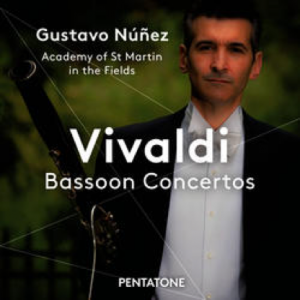 Bassoon Concerto in C major, RV 474 [9:26]
Bassoon Concerto in C major, RV 474 [9:26]- Bassoon Concerto in F major, RV 488 [8:17]
- Bassoon Concerto in B-flat major, RV 501 (La Notte) [9:14]
- Bassoon Concerto in C major, RV 477 [11:51]
- Bassoon Concerto in A minor, RV 497 [9:41]
- Bassoon Concerto in C major, RV 467 [10:55]
- Gustavo Núñez (bassoon)
- Academy of St Martin in the Fields
- Tomo Keller (leader)
rec. 2015
PENTATONE PTC5186539 [59:35] from eClassical.com in FLAC 24-bit Stereo, FLAC 16-bit Stereo or MP3 Stereo with pdf booklet
Antonio Vivaldi wrote a staggering number of concerti for bassoon, with 39 surviving works. Many bassoonists have recorded a selection of these, the latest of whom being Gustavo Núñez, principal bassoon with the Royal Concertgebouw Orchestra since 1995.
Gustavo Núñez, native of Montevideo and son of a bassoonist, studied with Kerry Camden in London and Klaus Thunemann in Hannover. He has a prodigious technique. None of the concerti featured here presents him with any difficulty. Núñez provides copious ornamentation, both in fast and slow movements. The pacing of the fast movements is often brisk but the playing never sounds hurried. The playing of Academy of St Martin in the Fields is spirited and full of energy.
The selection is a mix of the familiar with the unfamiliar. Hopefully that is a sign that there will be more to come, because this performance is as good as any version on modern bassoon that is currently in circulation.
Johann Georg LICKL (1769–1843)
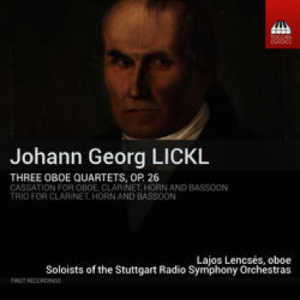 Three Quartets for Oboe and String Trio, Op. 26 (c. 1795)
Three Quartets for Oboe and String Trio, Op. 26 (c. 1795)- Quartet No. 1 in C major [14:20]
- Quartet No. 2 in G major [10:51]
- Quartet No. 3 in F major [14:48]
- Cassation in E flat major for oboe, clarinet, horn and bassoon (publ. 1795) [24:36]
- Trio in E flat major for clarinet, horn and bassoon (?1790s) [12:19]
rec. 2010 (quartets) and 2015
TOCCATA CLASSICS TOCC0350 [77:07] from eClassical.com as FLAC 16-bit Stereo or MP3 Stereo. No booklet
Johann Georg Lickl was an Austro-Hungarian composer previously unknown to me. This new Toccata release features his three oboe quartets Op. 26, Cassation in Eb for oboe, clarinet, horn and bassoon (previously attributed to Mozart), and Trio in Eb for clarinet, horn and bassoon. The music is quite tuneful and charming, if not consistently inspired. The oboe is given a fair amount of virtuosic passagework in the quartets. Cassation is, to me, the best work on this album.
I have always had a soft spot for oboist Lajos Lencsés. He has been an extremely prolific recording artist, and his recorded output includes many obscure works, new and old. In fact, in my formative years as an oboist, I learned a fair chunk of the repertoire listening to his recordings. His playing on this album is very good, if a little bit off his best, which is understandable because he was 67 when the quartets were recorded. The Cassation was recorded 5 years later.
The booklet, not available on eclassical.com but available for free download on Toccata’s website, contains notes by Lajos Lencsés that is given in its English translation only.
All in all, this album is a revelation. These quartets by Lickl are a breath of fresh air from the usual affairs of Mozart and Krommer. Thank you, Lajos Lencsés, again for expanding the oboe repertoire on record and for the excellent performance.
Wolfgang Amadeus MOZART (1756-1791)
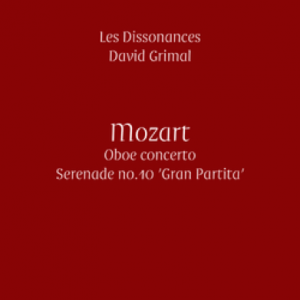 Oboe Concerto in C Major, K. 314 [19:08]
Oboe Concerto in C Major, K. 314 [19:08]- Serenade No. 10 in B-Flat Major, K. 361 “Gran Partita” [47:42]
- Alexandre Gattet (oboe)
- Les Dissonances
- David Grimal
rec. 2014 (K314) and 2015
Les Dissonances LD0074 [66:50] from eClassical.com as FLAC 24-bit Stereo, FLAC 16-bit Stereo or MP3 Stereo with pdf booklet
Alexandre Gattet, principal oboe of Orchestre de Paris and prize winner at the Munich ARD Competition in 2002, is featured in a live performance of Mozart’s Oboe Concerto from 2014. His playing is wonderfully assured, with a perfect technique and a round, even tone on his Marigaux oboe.
Gattet is joined by his colleagues of French wind players in another live performance, of Mozart’s Gran Partita, from 2015. Here is the full lineup of artists:
Oboes: Alexandre Gattet – Gildas Prado
Clarinets: Vicent Alberola Ferrando – Mariafrancesca Latella Basset horns: Alexandre Chabod -Naoko Yoshimura Bassoons: Julien Hardy – Frédéric Durand Horns: Antoine Dreyfuss – Hugues Viallon – Alexandre Collard -Pierre Burnet Double bass: Yann Dubost
Julien Hardy and Frédéric Durand both play on French-system bassoon, though their tones are much more rounded and less bright than that of Maurice Allard or Paul Hongne, their eminent predecessors.
The transparent, bright sound of the French school of wind playing of the 1950s – 1970s is replaced by the round, darker sound of the current generation, with less prominent use of vibrato. The French virtuosity remains, and the playing is polished and spirited. In the Gran Partita, there are some ritards at phrase endings/transitions that I find excessive and mannered, but overall the playing gives me a lot of pleasure.
This is a great album for anyone who is interested in hearing some of the finest French woodwind players of the younger generation.
English Recorder Music: The Dolmetsch Legacy
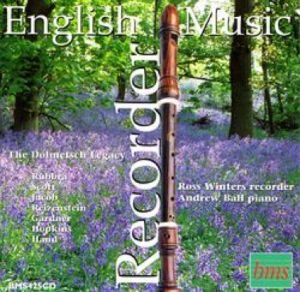 Gordon JACOB Variations
Gordon JACOB Variations- Cyril SCOTT Aubade
- Edmund RUBBRA Sonatina Op.128
- Antony HOPKINS Suite
- Edmund RUBBRA Passacaglia Sopra ‘Plusieurs Regrets’ Op.113
- John GARDNER Little Suite in C Op.60
- Edmund RUBBRA Meditazioni Sopra ‘Coeurs Désolés’ Op.67
- Colin HAND Sonata Breve
- Franz REIZENSTEIN Partita
- Ross Winters (recorder)
- Andrew Ball (piano)
rec. 2002
BRITISH MUSIC SOCIETY BMS425CD [73:56] from eClassical.com as FLAC 16-bit Stereo or MP3 Stereo. No booklet
This is an important release for recorder players and enthusiasts. Carl Dolmetsch commissioned a large number of works for recorder for his annual Wigmore Hall recitals. Many of these works have become part of the staple of 20th century recorder repertoire. This album features some of the best works among these commissions.
Carl Dolmetsch often gave suggestions to the composers during the genesis of the works, therefore it should be no surprise that all of these were written idiomatically for the recorder. These works, though composed in the 20th Century, are assessable to the listeners and are quite enjoyable. Some of the works use older dance forms, but are by no means pastiches.
The performance is excellent. Ross Winters, possibly playing a recorder with modern voicing, is technically assured and plays with a strong tone that balances well with the piano.
The lack of booklet on eclassical is a definite drawback, as I assume much background information on the composers and the pieces would be found in the booklet. Given the large number of composers feature, the lack of composer identification on the tracks is also a drawback, unless one is already familiar with the pieces. For these reasons, listeners will be better served purchasing a physical CD of this album.
These works had not been widely recorded previously, and this album serves as an invaluable guide to recorder players and teachers how these works should go. For this reason alone, this is a very important release. All in all, this is highly recommended for recorder enthusiasts.

